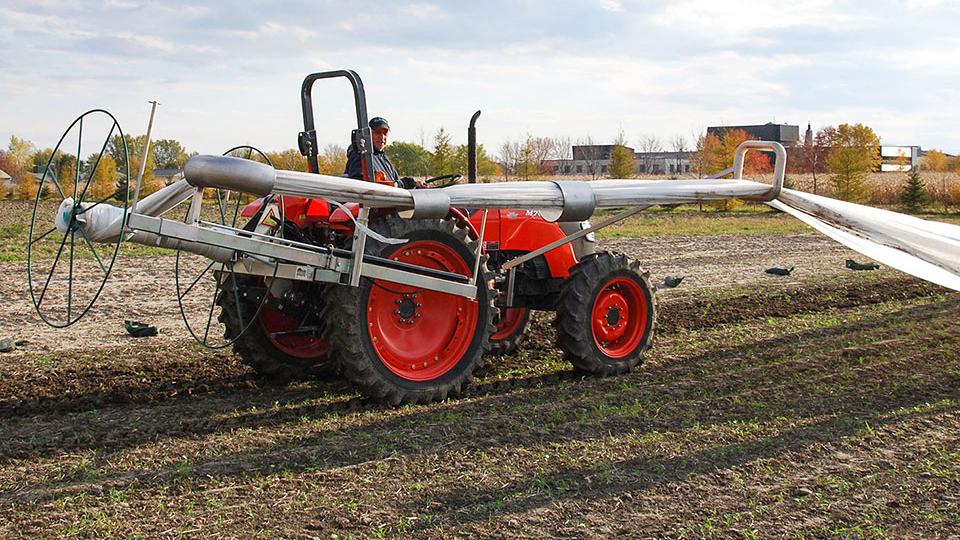2 Produce Growers Talk About Their Favorite Early Season Farm Equipment
The subject of preseason machinery — whether addressing row covers, early plastic laying, or the transplanting of early vegetable plants — quickly evolves into a discussion of farm management in light of current labor and inflation concerns.
Applying row covers exemplifies this. The strategy has become essential for growers intent on early plant establishment of large crops, such as sweet corn and early vegetable plants like summer zucchini and cucumbers.
But it can come at a price in terms of hours and dollars, according to Trevor Hardy, the Business Manager at Brookdale Fruit Farm in Hollis, NH.
“The handling of row covers — unrolling it, rerolling it, reusing it — that’s a huge labor component to using row cover systems,” Hardy says. “A sheet of 50 by 1,000-foot row cover right now is almost a thousand bucks. When you’re looking at covering an acre with a $2,000 investment, you want to try to reuse that a couple of years with the way costs are going.”
Hardy recommends the Hiwer System, distributed in the U.S. and Canada by Quebec-based Dubois Agrinovation. The machine winds and unwinds row covers and netting with a large spool so growers can store and reuse.
“It’s a great machine to help growers handle floating row covers in the field, for installing and retrieving,” Eric Menard, Business Development Director with Dubois Agrinovation, says.
“Floating row cover is one of the best tools out there to extend the season in early spring and late fall.”

The Hiwer machine facilitates the installation, removal, transportation to and from fields, and storage of row covers and netting.
Photo courtesy of Dubois Agrinovation
Transplanting Equipment
Before row covers enter the early season picture, some crops, such as lettuce, baby spinach, and other leafy greens, require transplanting, whether direct to soil or through plastic.
“They’re coming out of the high tunnel and going right to the field with row cover,” Hardy says.
Carousel transplanters, such as the Baby Compact and Baby Trium, manufactured in Italy by Checchi & Magli, are popular new machines, Hardy says. Canadian company RJ Equipment also produces its no-till Plug Planter.
The Italian manufacturers, because they have more options for different spacings, are best suited for small, diversified farms that want to do multiple plantings before applying a row cover, according to Hardy.
“[Those growers] can transplant a field, walk it, put wire hoops on, then use the Hiwer machine to pull the row cover out, sandbag it, and then go back to the next block and plant succession plantings early,” he says.
Not to be overlooked during the process of early transplanting is a constant awareness of frost protection, particularly in the era of climate change. This elevates the status of temperature monitors, wireless alerts, and calls for second layers of row covering.
Systems such as the Toro Ag Tempus Series Controller provide text alerts as to what is occurring under the row crop environment. In the irrigation department, the combination of Netafim USA’s MegaNet Rotating Sprinklers and its FlexNet Flexible Pipe delivers frost protection.
Tilling
Paul J. Licata, the Owner and President of BDi Machinery Sales, recommends a reverse rototiller, such as the Ortolan SA/SB stone and sod burier, for early season work. The machine works in stony soils while preparing sowed middles for replanting. It provides primary, secondary, and finishing tillage in one pass.
“We got [the Ortolan stone and sod burier] to replace a spader that we had for about 10 years,” says John Good, the Owner of The Good Farm in Germansville, PA. “It was a little bit worn out, so we wanted something to do a little bit better finish tillage job but also like a spader can do. We [can go] from an early spring cover crop to where you could plant carrots in it. It’s really heavy, which makes it a really strong rototiller, but you do need a little bit of power to lift it. The roller cage on the back makes a really nice, firm, level seed bed. It’s adjustable, but we set it so it’s quite tight, so when you do seed or transplant into it, you get nice seed and soil contact.”










